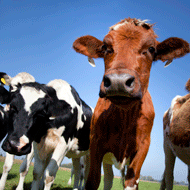
Work will be carried out by two regional suppliers
The Animal Plant and Health Agency (APHA) has confirmed the award of contracts for the supply of a flexible package of veterinary services across two regions covering Wales.
From April 1, 2015 all new TB testing and other Official Veterinarian (OV) work in Wales be carried out by two regional suppliers - Wales North and Wales South (Delivery Partners) - who will be in charge of allocating vets and making sure that testing is carried out to a high standard.
Simon Hall, APHA's veterinary director, believes that the contracts are a significant milestone in modernising the organisation's partnership with the veterinary profession in Wales.
"The new arrangements provide higher levels of assurance about quality of testing and value for money," he said.
"Testing will continue to be performed by fully qualified vets and APHA will carry on working in close partnership with the veterinary profession.
“Local veterinary practices have always made an invaluable contribution to national disease control programmes and this new arrangement underlines the critical role they will continue to play in protecting animal health and welfare.”
The contracts have been awarded for a three year period, with the option to extend up to an additional two years.
Livestock keepers and farmers in Wales will continue to be responsible for ensuring that TB testing is completed on time, but in future will need to contact their regional Delivery Partner to make the arrangements. Delivery Partners will then be responsible for allocating the actual testing activity through their network of practices, and for assuring the quality of the work performed.
APHA say that the new contracts will require Delivery Partners to offer testing work to eligible veterinary businesses operating within their geographical regions.
Work that has already be assigned to OV practices under existing arrangements will be completed by those practices from 1 April. All new work will be undertaken by Delivery Partners.
APHA add that farmers and livestock keepers can express a preference to use a specific veterinary practice within the Delivery Partner's network when making arrangements for tests, and this will be honoured where possible. Those who would prefer to use a practice that is not part of the Delivery Partner's network retain the option to pay for private testing.



 The veterinary mental health charity Vetlife is inviting the veterinary community to join it for a sponsored cold-water dip.
The veterinary mental health charity Vetlife is inviting the veterinary community to join it for a sponsored cold-water dip.